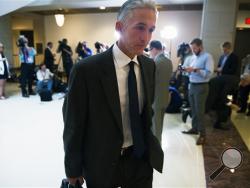WASHINGTON (AP) — A U.S. ambassador in a dangerous country asks the State Department for more security. Washington sends the ambassador a request for advice on talking points. Maybe, the ambassador jokes, he should seek help from another country.
But the escalating situation on the ground in Benghazi, Libya, in 2012 was no joke, and on Sept. 11, the ambassador, Chris Stevens, was dead along with three other Americans. Rep. Trey Gowdy, the chairman of a panel investigating the terrorist attacks there, is describing Stevens' pleas, and Washington's response, as a "total disconnect" that left the U.S. consulate vulnerable to attack.
"He didn't need help with (public relations), and he was asking for more security," Gowdy said on CBS' "Face the Nation." At about the same time, Gowdy said, a Clinton aide asked Stevens to read and respond to an email by a confidant of then-Secretary of State Hillary Rodham Clinton.
At one point, according to Gowdy, Stevens joked in an email: "Maybe we should ask another government to pay for our security upgrades because our government isn't willing to do it."
Gowdy refused to release the emails on Sunday.
But he described the emails as he defended his 17-month probe into the Sept. 11, 2012, attack that left Stevens and three other Americans dead, and anticipates Clinton's long-awaited public testimony on Thursday. The event is a make-or-break moment for the investigation that even some Republicans say was designed to undermine Clinton's second bid for president.
"I have told my own Republican colleagues and friends, 'Shut up talking about things that you don't know anything about,' " Gowdy said Sunday on CBS.
Gowdy, a former prosecutor, insisted that his investigation is focused on the events before, during and after the deadly attacks. On Sunday, he cast Clinton as "just one out of 70" witnesses and suggested her testimony is of equal value with the others, at best. He's only interested in Clinton's testimony because she was secretary of state at the time of the attacks, so "you have to talk to her," Gowdy said.
Of more interest, he suggested, is one week in June 2012 that's covered by Stevens' emails and is key to the investigation.
As Gowdy describes them, Stevens' emails paint a picture of a newly installed ambassador in an increasingly dangerous country. Almost immediately, he "knows that there's been an uptick in violence, and he's asking for more security," Gowdy said on CBS.
"On almost exactly that day," Clinton aide Jake Sullivan asks Stevens to read and respond to an email from Sidney Blumenthal, "who knows nothing about Libya," Gowdy says.
Apparently, Victoria Nuland, who is now assistant secretary of state for European and Eurasian Affairs, also emailed Stevens, "and said: 'We need help with your public messaging advice.'"

